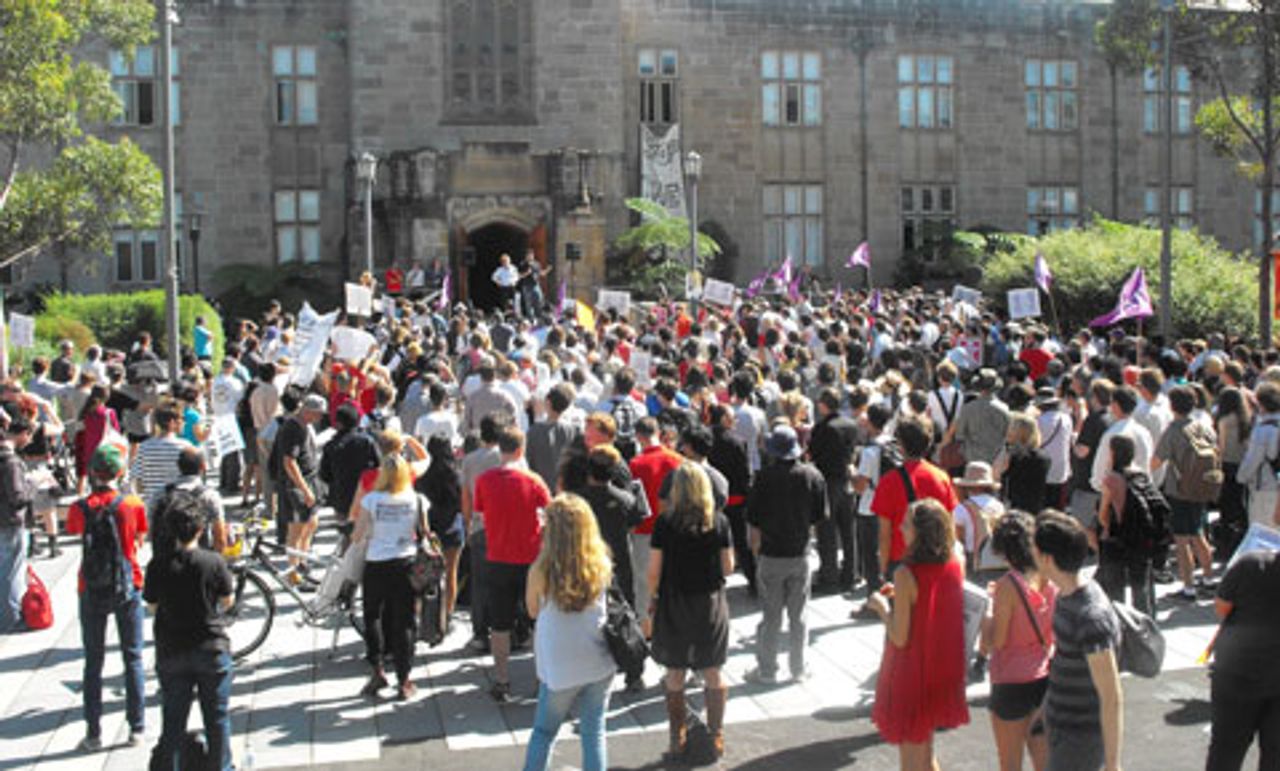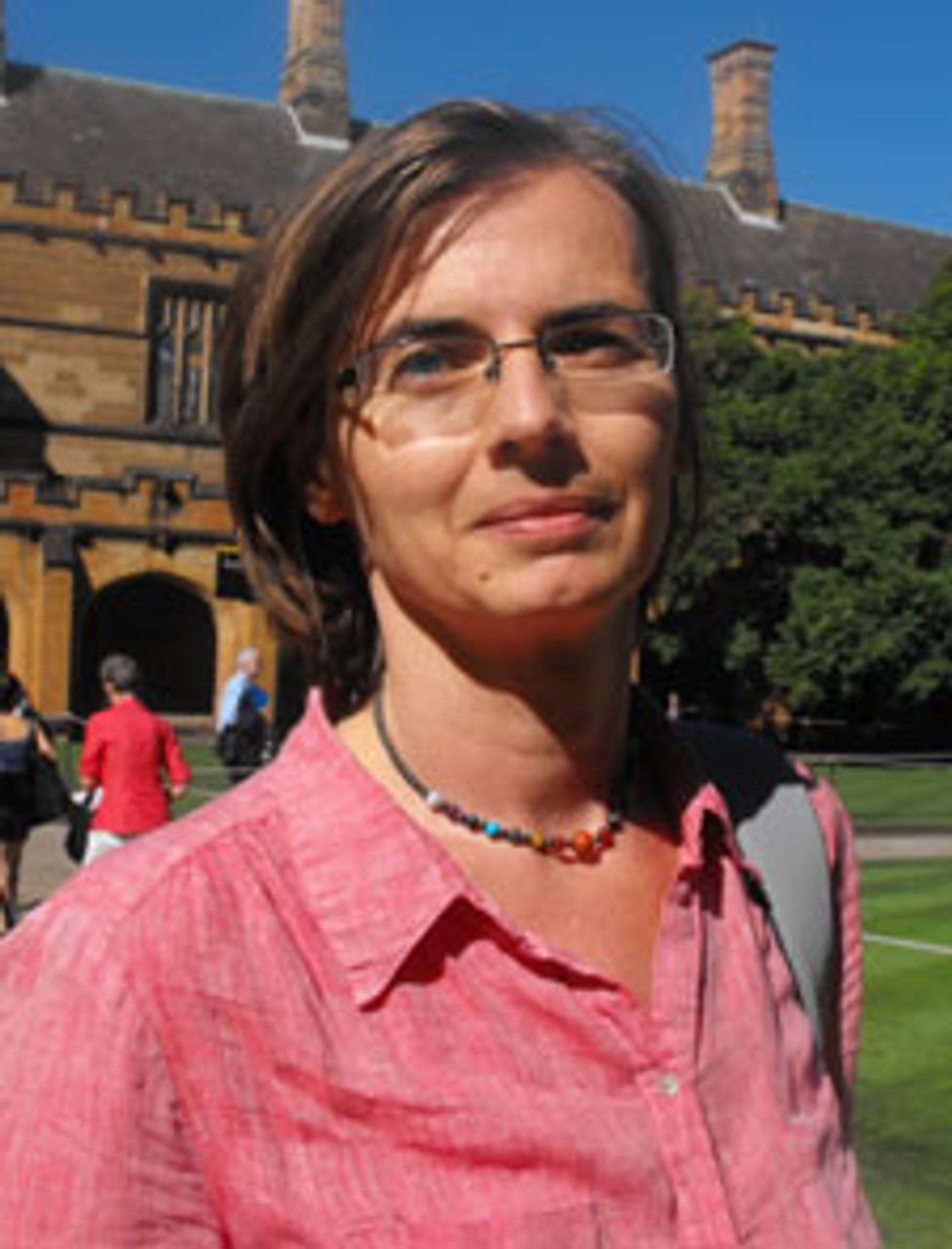 The student demonstration
The student demonstrationAs many as 1,000 students, academics and general staff members demonstrated at the University of Sydney on Wednesday to voice their opposition to the planned destruction of up to 340 jobs by next semester. The event was organised by the National Tertiary Education Union (NTEU) and the Education Action Group, which is politically dominated by pseudo-left groups such as Solidarity and Socialist Alternative.
The protest was the second since the academic year began. The significant turn-out revealed the extent of concern over the threatened job losses and the wider assault on tertiary education that is being driven by the Gillard Labor government’s “education revolution” agenda. Insufficient funding has led to expanded class sizes and over-stretched facilities. Academic and staff positions are being slashed at universities around the country to cut costs.
The NTEU organisers, however, as they did at the previous rally, sought to prevent any discussion on the context of the job cuts, the policies of the Labor government and the union’s collaboration with them.
Michael Thomson, the NTEU president at Sydney University, chaired the event and obscured the broader assault on tertiary education. He portrayed the job cuts as simply the outcome of greed and vindictiveness on the part of the university management. He told the rally that no cuts were necessary at Sydney because the university had a $113.7 million cash surplus. He said the administrators could be pressured to change their minds.
Grahame McCulloch, the NTEU general secretary, also presented the issues as confined to the University of Sydney. He told students that they faced “a struggle about the vision that underpins this university,” with the administration seeking to turn it into “a corporate bureaucracy in which the only objective of the management is to weigh and measure everything.” The job destruction taking place at other universities was barely mentioned by the union speakers.
Members of the International Students for Social Equality (ISSE) distributed a statement explaining that the cuts stemmed from the Labor government’s policies and warning that the NTEU had agreed to job losses at other universities. ISSE members demanded to be allowed to address the demonstration in order to oppose the union claims and make clear that the attacks went far beyond a single chancellor and university. Michael Thomson flatly refused, telling ISSE representatives that “you are not going to put speakers on the list.” He also rejected the ISSE’s call for other students to be allowed to speak.
The pseudo-left-dominated Education Action Group functioned as an apologist for the union. It joined with the NTEU in presenting the issues as confined to the University of Sydney and sought to channel the demonstration into a sit-in at the Faculty of Social Science. Barely 50 students joined in this diversion.
The sole purpose of the sit-in stunt was to block political discussion and channel opposition into futile appeals to the university administration. In consultation with the union, the job losses are now proceeding within the framework of the current enterprise agreement signed by the NTEU. A far-reaching precedent is being set. Academics who have not met the arbitrary requirement that they produce four research papers in three years are being pressured to take redundancies, or demotions to teaching-only positions that do not provide the conditions associated with tenured posts.
A genuine campaign to oppose the attacks at the University of Sydney and other universities requires a political struggle against the Gillard government and its “education revolution”, which is driving the restructuring of tertiary institutions across the country. The NTEU has no fundamental disagreement with the Labor government, which is why it accepts the job losses and opposes any unified national campaign to defend conditions.
Against the union and its apologists, the ISSE calls for the development of independent committees of academics, students and other university staff that would fight to develop a unified industrial and political campaign across all campuses against the Gillard government’s pro-market agenda. Such committees would turn out to secondary and TAFE teachers and students, and other sections of workers and youth, who are facing similar attacks. What is necessary is the fight for a workers’ government based on socialist policies, which will guarantee the fundamental social right to a free, high quality education.
The ISSE spoke to numbers of students and academics taking part in Wednesday’s protest about the cuts and the political perspective advanced at the rally.
 Tatiana Seizova-Cajic
Tatiana Seizova-CajicTatiana Seizova-Cajic, an academic in the Health Sciences department, denounced the retrenchments. “The process is all wrong,” she said. “These are not genuine redundancies. It’s a quick and efficient way to improve research credibility on paper but it’s no way to improve research. To do that, they need to invest in building up and training researchers.”
Seizova-Cajic pointed to the implications of the methods being used to target academics for removal. “It could also be that they want to get rid of people that the present [enterprise] agreement doesn’t allow them to. It will be totalitarian. They can employ people they like and get rid of those they don’t.”
Laurence Barratt-Manning, who is studying English and philosophy, said: “I’ve certainly noticed over my four years at university a decline in the quality of both the English and philosophy departments, and sackings and restructuring that could only be called ideological.” Speaking of the targeted academics, he said: “These are teachers who really know what it means to teach and interact with other students, and they’re not being respected for it.”
Barratt-Manning disagreed with the political line of the rally. “I think there’s too much of a tendency in nominally leftist politics to see things that are going wrong as an aberration from the system. Everything has to be seen as a manifestation of much wider political issues. I think you are exactly right. This is a neo-liberal policy that is coming down to education, health and the environment.
“Seeing the structural things that cause this really does allow the links to be drawn between all these different things. It’s not just this university. It’s not an aberration. It’s happening everywhere in Australia. It’s happening everywhere in the world.”
Receive news and information on the fight against layoffs and budget cuts, and for the right to free, high-quality public education for all.
